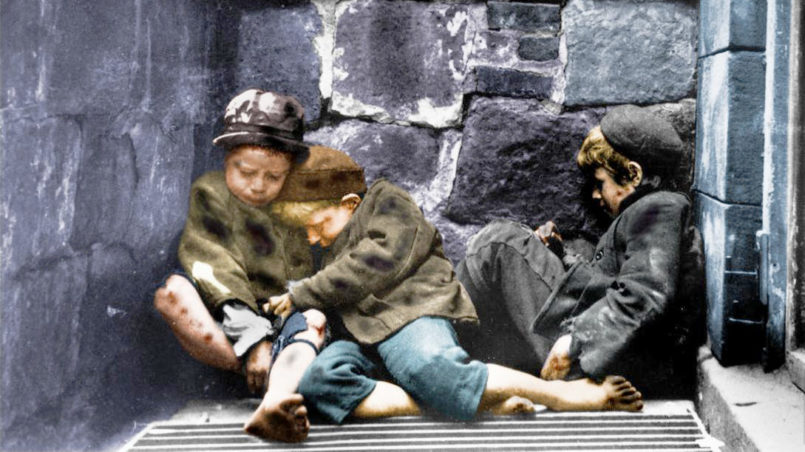We Ignore the Impoverished

One does, after all, have standards …
Our everyday life is full of endlessly repeated reminders of how a successful life has to look. Small deviations from this image may still be tolerated as a lovable human imperfection. But anyone failing – or, worse, unwilling – to match it at all triggers an impulse of hostility in others. This is no surprise, as group consensus is all but sacred to us humans, and, of all things, the breach of the unspoken rules (which cannot be criticized and questioned because they are implicit) is one of the greatest taboos.
The more illogical an order is, the stronger deflection and also self-censorship need to be if a group does not want to lose its unity. It is true that one can dress differently, thus seemingly indulging individualism, but opinions which diverge too greatly from the mainstream are to be avoided. The view that poverty is by no means self-inflicted is one of these unpopular ideas and is impatiently swept aside in conversations. This mechanism, which puts consensus above truth, may provide peace in small tribal communities, but in our networked world (which is seriously at risk precisely because of our mental inertia), this is seriously outdated and out of place.
The fig leaf of ignorance
We willingly believe the thinnest explanations telling us that all the worldly misery is unavoidable and unchangeable. The dishonesty of this starts with the fact that we, the West, are bleeding the rest of the world, holding them in tangle contracts, consuming ten times more than our due – the bitter poverty elsewhere being a direct consequence of our wealth here.
In the end, we tell ourselves, the inhabitants of poor countries are simply lazy and disorganized – and since we do not know them, it is easy to maintain this self-deception. But we also do not want to hear that right in the midst of us there live people who have never had a chance of a happy, productive and successful life, starting from childhood.
Know your place
Perhaps these are remnants of the medieval school of thought, which equates riches with God’s special affection, while poverty is presented as a test of humility. Anyone rebelling, therefore, directly opposed the will of the Lord – very handy for the wealthy, who then had free reign to bleed their subordinates with impunity. In our enlightened world, God’s part in this has been replaced by the myth of luck and ambition, which completely ignores the fact that no amount of hard work can make up for an immeasurable starting disadvantage and that on top of that, anyone will eventually lose strength, knowing that they are simply not paid fairly. Contrary to all sense of reality, in a hazy sort of way, we believe that poor people simply have not been using their chances wisely and thus somehow deserve to be where they are. We ignore them as individuals, and do not take any steps to change anything about the unjustice of the distribution of wealth.
Who are the eternal losers and how did they get into their position?
What we see before us when looking at a failed person is the result of years of demoralization. Nobody decides freely to choose a life without sense, drive and respect from their fellow human beings – there is always a history of failed attempts and unfortunate circumstances behind the present state. In the case of humans from economically ailing countries, perhaps the lack of opportunity is still comprehensible to us (minus the “lazy and disorganized” factor) … but what about the outcasts of our own “rich” society?
A large number of those who simply cannot seem to get ahead in life had a desolate, traumatizing childhood, the consequences of which constantly drain their strength and lead them to making bad decisions. From the perspective of a successful person, it may sound whiny that someone would blame injustices so long past for their current precarious situation – but every statistic confirms this:
Every achievement of such a child is earned three times harder than for others.
Yes, even a child from the poorest of circumstances can be successful if they just so happen to be exceptionally clever, imaginative, willing to learn, hardworking, strong-willed and, to top it off, healthy and resilient. This is rarely true for anyone even in the middle class – how much less likely is it for children from poor backgrounds (since constant fear of scarcity – for several reasons – also causes mental impoverishment)?
As long as the children of wealthy parents remain rich, regardless of whether they have even a single positive quality … as long as people from the middle class can just about stay afloat with lifelong manish diligence – or with very good fortune perhaps come to modest prosperity … and as long as people from precarious circumstances always remain there (unless they are the one in every thousand holding the golden ticket of being gifted and lucky) … as long as these things are in place, there will be such huge injustice at the very center of our society, leaving each of us with two options: Close your eyes, pay respect to the taboo and be part of the problem – or try to change things and live with the fact that you and your views will be belittled in conceited ignorance.
Credits
| Image | Title | Author | License |
|---|---|---|---|
 |
Budapest “Keleti”, August 2015 | Isabel Scharrer | CC BY-SA 4.0 |
 |
Children Sleeping in Mulberry Street | Kelly Short | Public Domain Mark 1.0 |
